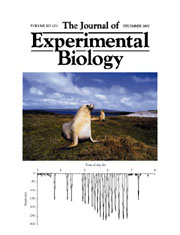
January 1, 2001
Publications
Daniel Costa
 An article on New Zealand sea lions by professor of ecology and evolutionary
biology Daniel Costa was featured on the cover of the December issue of the Journal
of Experimental Biology.
An article on New Zealand sea lions by professor of ecology and evolutionary
biology Daniel Costa was featured on the cover of the December issue of the Journal
of Experimental Biology.
The New Zealand sea lion dives deeper and longer than any of the other eared
seals (which include sea lions and fur seals). Costa and his coauthor, Nicholas Gales
of the New Zealand Department of Conservation, investigated the New Zealand sea lion's
diving behavior and foraging energetics.
The researchers recorded dives as deep as 550 meters (1,800 feet) and as long as
11.5 minutes. Typical dives were around 4 minutes long and 123 meters (400 feet)
deep.
Costa was interested whether the New Zealand sea lion is physiologically adapted
for prolonged diving, perhaps by lowering its metabolic rate during dives. The study,
however, showed that its diving ability is not explained by a reduced metabolic rate.
New Zealand sea lions use a "burst and glide" strategy to conserve energy
during dives. They also have a large blood volume compared to related species, giving
them increased oxygen-storage capacity, but Costa said the animals appear to be operating
near their physiological limits during dives.
In comparing New Zealand sea lions with Antarctic fur seals, which make shallow short
dives, the researchers found that the two species had surprisingly similar rates
of energy expenditure while at sea. How they budgeted their energy expenditures differed,
however, reflecting differences in the distribution of their prey.
Peter Raimondi, Mark Carr
Two UCSC biologists served on a UC Marine Council scientific advisory committee
that has just published a report on the ecological impacts of oil rig decommissioning
in California. Peter Raimondi, associate professor of ecology and evolutionary
biology, Mark Carr, assistant professor of ecology and evolutionary biology, and
four other UC experts authored the report, entitled "Ecological
Issues Related to Decommissioning of California's Offshore Production Platforms."
The UC Marine Council was established in 1999 and is chaired by Gary Griggs,
director of the Institute of Marine Sciences. Shortly after it was created, state
senator Dede Alpert of San Diego asked UC President Richard Atkinson to convene a
blue ribbon commission to assess the ecological impacts of decommissioning California's
offshore oil production facilities. This is a major issue in southern California
with potentially huge financial impacts. The marine council set up the scientific
advisory committee, which spent six months investigating the issue and preparing
the new report.